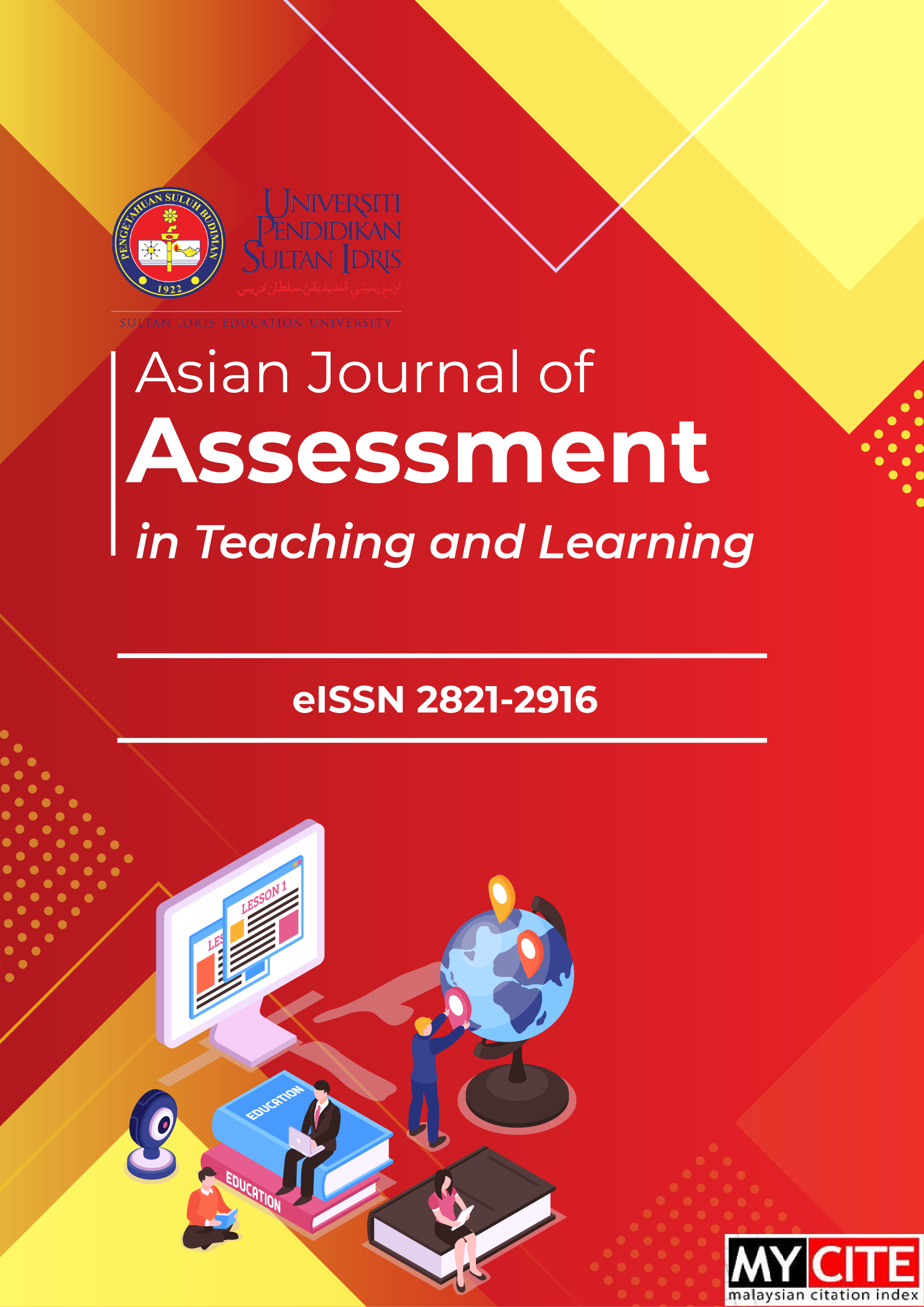Assessing the Extent of Utilization and Availability of Artificial Intelligence in Teaching and Assessment of Students by Lecturers in University
DOI:
https://doi.org/10.37134/ajatel.vol14.2.7.2024Keywords:
Artificial Intelligence, Assessment of Students, Availability and Utilization, Lecturers, Teaching of StudentsAbstract
This study assessed the extent of utilization and availability of Artificial Intelligence (AI) in teaching and assessment at Ambrose Alli University. As educational paradigms shift towards digitalization. This study employed survey research design. A snowball sampling method was used to select 103 lecturers who provide the relevant data or information regarding the extent of availability and utilization of AI in teaching and assessment of students. The instrument for data collection was a self-developed semi structured questionnaire, entitled Availability and Utilization of AI in Teaching and Assessment of Students by Lecturers in Ambrose Alli University (AUAITASLAAU). The Statistical Package for Social Sciences version 23.0 was used to analyze the data collected. The study found that a positive reception of AI-enhanced teaching and assessment tools among both Lecturers and Students, highlighting increased engagement, personalized learning experiences, and efficient assessment mechanisms. However, concerns related to data privacy, accessibility, and technological proficiency remain significant barriers to widespread AI adoption. The author logically concluded that the adoption of AI for teaching and assessment of students by lecturers within the university setting will measurably improve the teaching and unbiased assessment of students. The author recommended, among others, that before implementing AI, the management of Ambrose Alli University should endeavour to improve on the quality of electricity power supply.
Downloads
References
Adams, R., & Jervis, S. (2021). Personalized learning in higher education: The role of AI-driven systems. Journal of Educational Technology, 15(3), 234-249.
Baker, R. S., & Siemens, G. (2020). Predictive analytics and education: An overview. Educational Technology Research and Development, 68(4), 1925-1948.
Barrett, M., Branson, L., Carter, S., DeLeon, F., Ellis, J., Gundlach, C., & Lee, D. (2019). Using Artificial Intelligence to enhance educational opportunities and student services in higher education. Inquiry: The Journal of the Virginia Community Colleges, 22(1), 1-10.
Buabbas, A.J., Miskin, B., Alnaqi, A.A., Ayed, A.K., Shehab, A.A., Syed-Abdul, S., & Uddin, M. (2023). Investigating students’ perceptions towards Artificial Intelligence in medical education. Healthcare, 11, 1-16.
Celuch, K., & Robinson, N.M. (2016). How the customer feedback process contributes to perceived customer orientation and affective commitment in the higher educational service context. The Journal of Consumer Satisfaction, Dissatisfaction and Complaining Behavior, 29, 53-76.
Chen, H., & Liu, Y. (2023). Virtual laboratories and interactive simulations: Leveraging AI for remote learning. Computers & Education, 168.
Cheng, L., Umapathy, K., Rehman, M., Ritzhaupt, A., Antonyan, K., Shidfar, P., Nichols, J., Lee, M., & Abramowitz, B. (2023). Designing, Developing, and Validating a Measure of Undergraduate Students’ Conceptions of Artificial Intelligence in Education. Journal of Interactive Learning Research, 34(2), 275-311.
Dinu, V. (2011). The knowledge-based economy: Implications for higher education in economics and business. Amfiteatru Economic, 13(30), 343-344.
European Commission. Joint Research Centre. (2018). The impact of Artificial Intelligence on learning, teaching, and education. LU: Publications Office. Retrieved from https://data.europa.eu/doi/10.2760/12297.
Gasmi, G., & Prlja, D. (2021). Ugrožavanje ljudskih prava i veštačka inteligencija. Zbornik radova Kopaoničke škole prirodnog prava – Slobodan Perović, pp. 323-335.
Idroes, G.M., Noviandy, T.R., Maulana, A., Irvanizam, I., Jalil, Z., Lensoni, L., Lala, A., Abas, A.H., Tallei, T.E. and Idroes, R. (2023). Student perspectives on the role of Artificial Intelligence in Education: A Survey-based Analysis. Journal of Educational Management and Learning, 1(1), 8-15.
Jeffrey, T., 2020. Understanding college student perceptions of Artificial Intelligence. Systemics, cybernetics and informatics, 18(2), 8-13.
Johnson, M., & Smith, L. (2022). Enhancing student support through AI-powered chatbots. Higher Education Research & Development, 41(2), 189-204.
Jones, M., & Clark, M. (2023). AI-based proctoring: Ensuring academic integrity in remote assessments. International Journal of Educational Technology in Higher Education, 20(1), 1-18.
Kim, J., & Lee, S. (2023). AI-driven proctoring in online examinations: Ensuring academic integrity in digital learning environments. International Journal of Educational Technology in Higher Education, 20(1), 45.
Kuleto, V., Ilić, M., Dumangiu, M., Ranković, M., Martins, O.M.D., Păun, D. and Mihoreanu, L. (2021). Exploring opportunities and challenges of Artificial Intelligence and Machine Learning in higher education institutions. Sustainability, 13(18).
Manning, C. (2020). Artificial Intelligence Definitions. Stanford University: Human-Centered Artificial Intelligence.
Marrone, R., Taddeo, V., & Hill, G. (2022). Creativity and Artificial Intelligence: A student perspective. Journal of Intelligence, 10(3).
Martin, K., & Lee, H. (2022). AI-powered plagiarism detection: Ensuring academic integrity in the digital age. Journal of Academic Ethics, 20(1), 50-65.
Martinez, P., & Rodriguez, L. (2024). Ethical considerations and data privacy in AI-driven educational technologies. Journal of Information Ethics, 12(1), 30-45.
Merchant, Z., Goetz, E. T., Cifuentes, L., Keeney-Kennicutt, W., & Davis, T. J. (2021). Virtual reality and education: An overview. Journal of Educational Technology, 15(1), 20-35.
Sangapu, I. (2018). Artificial Intelligence in education: From a teacher and a student perspective. SSRN Electronic Journal. https://doi.org/10.2139/ssrn.3372914.
Shah, S., & Kwok, A. (2022). Automated grading systems in higher education: A comparative study. Assessment & Evaluation in Higher Education, 47(3), 456-470.
Smith, J., Brown, T., & Williams, R. (2023). AI-driven content creation and curation: Transforming educational practices. International Journal of Artificial Intelligence in Education, 26(2), 120-135.
Williams, A., & Brown, D. (2022). Automated grading systems: An evaluation of AI-based approaches. Assessment & Evaluation in Higher Education, 47(5), 698-713.
Woolf, B. P. (2019). Intelligent tutoring systems: Past, present, and future. Educational Psychology Review, 31(2), 297-316.
Downloads
Published
How to Cite
Issue
Section
License
Copyright (c) 2024 Margaret Ose Asika, I. James Asika

This work is licensed under a Creative Commons Attribution-NonCommercial-ShareAlike 4.0 International License.





